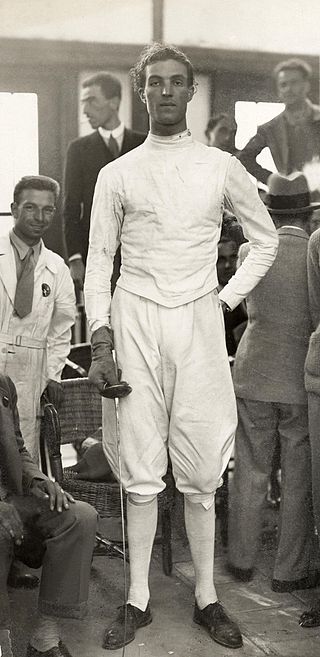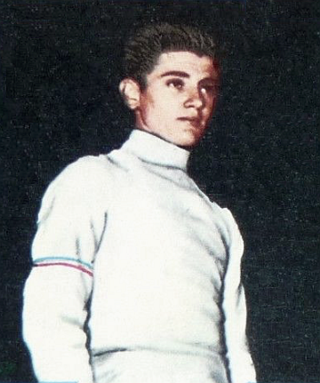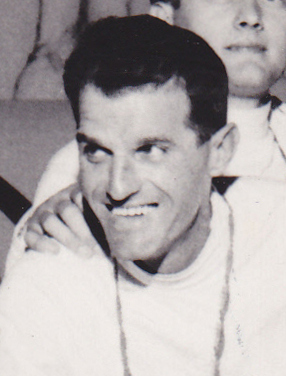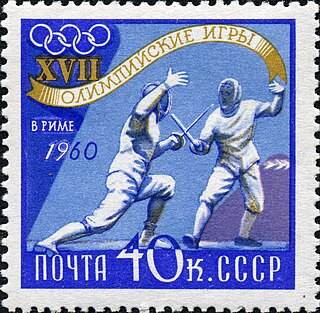The women's foil was one of seven fencing events on the fencing at the 1932 Summer Olympics programme. It was the third appearance of the event. The competition was held from 2 to 4 August 1932. 17 fencers from 11 nations competed, with one additional fencer entered but withdrawing.

The men's épée was one of seven fencing events on the fencing at the 1936 Summer Olympics programme. It was the ninth appearance of the event. The competition was held from 9 August 1936 to 11 August 1936. 68 fencers from 26 nations competed. Nations were limited to three fencers. The event was won by Franco Riccardi of Italy, the nation's second consecutive victory in the men's épée. Riccardi's teammates Saverio Ragno and Giancarlo Cornaggia-Medici took silver and bronze, respectively, to give Italy a medal sweep—Italy's first and the fourth overall in the event. Cornaggia-Medici, who had won gold in 1932, became the fourth man to win multiple medals in the individual épée. For the first time, France competed in the event but did not win any medals.

The men's foil was one of seven fencing events on the fencing at the 1936 Summer Olympics programme. It was the ninth appearance of the event. The competition was held from 5 August 1936 to 6 August 1936. 62 fencers from 22 nations competed. Nations were limited to three fencers. The event was won by Giulio Gaudini of Italy, the nation's second consecutive and fourth overall victory in the men's foil. Gaudini, who had won bronze medals in 1928 and 1932, was the first man to win three medals in the event. His countryman Giorgio Bocchino took bronze. Edward Gardère put France back on the podium after a one-Games absence.
The men's sabre was one of seven fencing events on the fencing at the 1936 Summer Olympics programme. It was the tenth appearance of the event. The competition was held from 14 August 1936 to 15 August 1936. 71 fencers from 26 nations competed. Nations were limited to three fencers each. The event was won by Endre Kabos of Hungary, the fourth of nine straight Games in which a Hungarian would win the event. Kabos became the second man to win multiple medals in the individual sabre, adding to his 1932 bronze. Gustavo Marzi of Italy took silver, while Hungarian Aladár Gerevich earned bronze.

The men's épée was one of seven fencing events on the fencing at the 1948 Summer Olympics programme. It was the tenth appearance of the event. The competition was held from 7 August 1948 to 9 August 1948. 66 fencers from 25 nations competed. The event was won by Luigi Cantone of Italy, the nation's third consecutive victory in the men's épée. Italy also earned its third consecutive bronze medal in the event, with Edoardo Mangiarotti's third-place finish. Between the two Italians was Oswald Zappelli of Switzerland, taking the silver medal.

The men's foil was one of seven fencing events on the fencing at the 1948 Summer Olympics programme. It was the tenth appearance of the event. The competition was held from 3 August 1948 to 4 August 1948. 63 fencers from 25 nations competed. The event was won by Jehan Buhan of France, the nation's first victory in the men's foil since 1928 and fifth overall. His countryman Christian d'Oriola took silver, while Lajos Maszlay earned Hungary's first medal in the men's individual foil with his bronze.
The women's foil was one of seven fencing events on the fencing at the 1948 Summer Olympics programme. It was the fifth appearance of the event. The competition was held from 31 July 1948 to 2 August 1948. 39 fencers from 15 nations competed.

The men's sabre was one of seven fencing events on the fencing at the 1948 Summer Olympics programme. It was the eleventh appearance of the event. The competition was held from 12 August 1948 to 13 August 1948. 60 fencers from 24 nations competed. Nations were limited to three fencers each. The event was won by Aladár Gerevich, the fifth of nine straight Games in which a Hungarian would win the event. Gerevich became the third man to win multiple medals in the individual sabre, adding to his 1936 bronze. Vincenzo Pinton of Italy took silver and Pál Kovács of Hungary took bronze; it was the third straight Games where the sabre podium was Hungary-Italy-Hungary.

The men's épée was one of seven fencing events on the fencing at the 1952 Summer Olympics programme. It was the eleventh appearance of the event. The competition was held from 27 July 1952 to 28 July 1952. 76 fencers from 29 nations competed. Nations were limited to three fencers each. The event was won by Edoardo Mangiarotti of Italy, the nation's fourth consecutive victory in the men's épée. It was also the fourth consecutive year that Italy had at least two fencers on the podium in the event, as Edoardo's brother Dario Mangiarotti took silver. Bronze went to Oswald Zappelli of Switzerland. Zappelli and Edoardo Mangiarotti had faced each other in a barrage for silver and bronze medals in 1948, which Zappelli had won; the two men were the fifth and sixth to earn multiple medals in the event.

The men's foil was one of seven fencing events on the fencing at the 1952 Summer Olympics programme. It was the eleventh appearance of the event. The competition was held from 23 July 1952 to 24 July 1952. 61 fencers from 25 nations competed. All three medallists were left-handed. Nations were limited to three fencers each since 1928. The event was won by Christian d'Oriola of France, the nation's second consecutive victory in the men's foil and sixth overall. D'Oriola was the fifth man to win multiple medals in the event. The silver and bronze medals were won by Edoardo Mangiarotti and Manlio Di Rosa of Italy.
The women's foil was one of seven fencing events on the fencing at the 1952 Summer Olympics programme. It was the sixth appearance of the event. The competition was held from 26 July 1952 to 27 July 1952. 37 fencers from 15 nations competed.

The men's sabre was one of seven fencing events on the fencing at the 1952 Summer Olympics programme. It was the twelfth appearance of the event. The competition was held from 31 July 1952 to 1 August 1952. 66 fencers from 26 nations competed. Nations were limited to three fencers each. The event was won by Pál Kovács, the sixth of nine straight Games in which a Hungarian would win the event. Kovács became the fourth man to win multiple medals in the individual sabre, adding to his 1948 bronze. Hungary swept the medals in the event for the second time. Aladár Gerevich's silver completed a set of three different color medals in the event, the first man to win three medals in individual sabre. Tibor Berczelly earned bronze.

The men's foil was one of seven fencing events on the fencing at the 1956 Summer Olympics programme. It was the twelfth appearance of the event. The competition was held on 26 November 1956. 32 fencers from 14 nations competed. Nations had been limited to three fencers each since 1928. The event was won by Christian d'Oriola of France, the second man to successfully defend an Olympic title in the foil and second man to win three medals in the event. It was France's third consecutive and seventh overall victory in the event. As in 1952, the next two spots were taken by Italians, this time Giancarlo Bergamini and Antonio Spallino.

The men's sabre was one of seven fencing events on the fencing at the 1956 Summer Olympics programme. It was the thirteenth appearance of the event. The competition was held on 5 December 1956. 35 fencers from 17 nations competed. Nations had been limited to three fencers each since 1928. The event was won by Rudolf Kárpáti, the seventh of nine straight Games in which a Hungarian would win the event. Jerzy Pawłowski of Poland took silver and Lev Kuznetsov of the Soviet Union took bronze, the first medals in the event for each nation and the first time since 1924 that any nation other than Hungary and Italy earned a medal in the men's sabre.

The men's foil was one of eight fencing events on the fencing at the 1960 Summer Olympics programme. It was the thirteenth appearance of the event. The competition was held from 29 – 30 August 1960. 78 fencers from 31 nations competed. Nations had been limited to three fencers each since 1928. The event was won by Viktor Zhdanovich of the Soviet Union, with his countryman Yury Sisikin the runner-up; they were the nation's first medals in the event. The Soviets nearly swept the medals, with Mark Midler advancing to a three-man barrage for third place before finishing in fifth place. Albie Axelrod's bronze put the United States on the podium for the event for the first time since 1932. Traditional powers Italy and France, who between them had won 11 of 12 gold medals and 9 of 12 silver, were kept off the podium entirely.
The men's team foil was one of eight fencing events on the fencing at the 1960 Summer Olympics programme. It was the tenth appearance of the event. The competition was held on 2 September 1960. 77 fencers from 16 nations competed.

The men's épée was one of eight fencing events on the fencing at the 1960 Summer Olympics programme. It was the thirteenth appearance of the event. The competition was held from 5 to 6 September 1960. 79 fencers from 32 nations competed. Each nation was limited to three fencers. The event was won by Giuseppe Delfino of Italy, the nation's sixth consecutive victory in the men's épée. Delfino, who had taken silver in 1956, was the seventh man to win multiple medals in the event. Silver went to Allan Jay of Great Britain and bronze to Bruno Habārovs of the Soviet Union, the first-ever medal in the event for both nations. It was the first time during Italy's gold-medal streak that the nation did not have a second medalist as well.

The men's team épée was one of eight fencing events on the fencing at the 1960 Summer Olympics programme. It was the eleventh appearance of the event. The competition was held on 9 September 1960. 105 fencers from 21 nations competed.

The women's foil was one of eight fencing events on the fencing at the 1960 Summer Olympics programme. It was the eighth appearance of the event. The competition was held from 31 August – 1 September 1960. 56 fencers from 24 nations competed.

The women's team foil was one of eight fencing events on the fencing at the 1960 Summer Olympics programme. It was the first appearance of the event. The competition was held on 3 September 1960. 57 fencers from 12 nations competed. The winner of the tournament was the Soviet Union, followed by Hungary and Italy in third.














